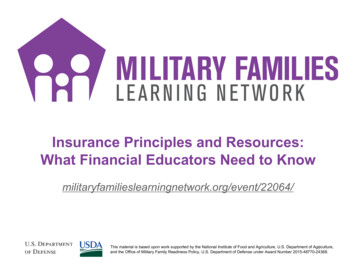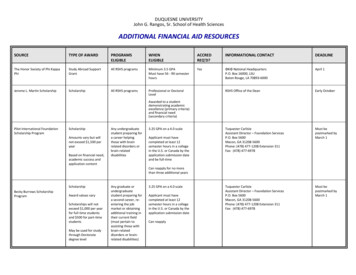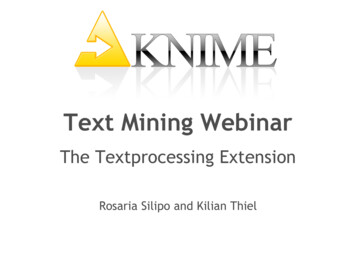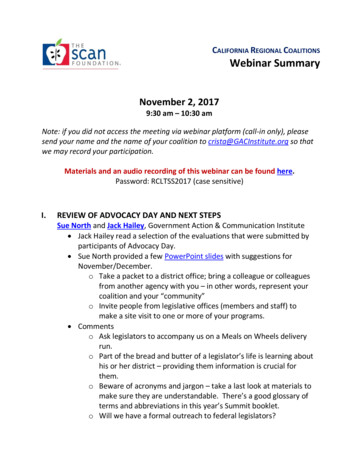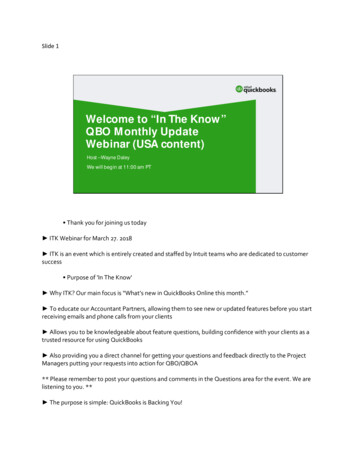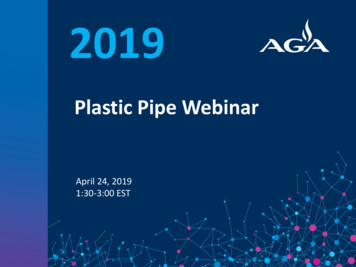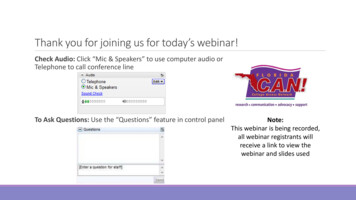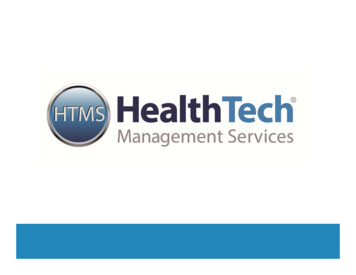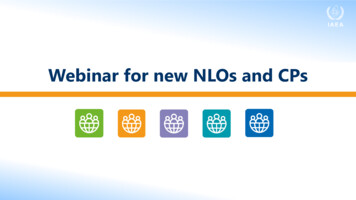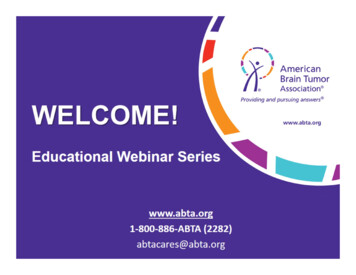
Transcription
Financial &Legal Resources forBrain Tumor PatientsCrystal Ward, MSW, LSWOncology Social Worker/Program ManagerAmerican Brain Tumor Association
Presenter DisclaimerI do not have a conflict of interest relatingto this educational activity.
Today’s Agenda Financial Concerns for Brain Tumor Patients Health Insurance Employment and Disability Prescription Assistance Special Considerations How Family and Friends can help Resources
Financial Concernsfor Brain Tumor Patients and Families Treatment options are limited Brain Tumor treatment ranked most expensive ofall cancers Other “hidden” costs:– Transportation– Housing– Home Health– Loss of Spousal Income
Talking about Money can be Difficult Most patients don’t tell Most health care teams don’t ask Breaking Down Barriers Better Treatment andContinuity of Care Acknowledge financial concerns –“It is typical for brain tumor patients and families tohave questions about the cost of treatment. Pleaselet us know if you have any concerns or issues withthese costs. We want to ensure you get the besttreatment and care possible.”
Necessity of Insurance Medical Costs– Average Cost of Craniotomy 50,000- 150,000– 29,400 per year for GBM treatment Types of Insurance– Employer provider plans HMO PPO– Private Insurance– State options/Medicaid– Medicare– ACA Exchanges
Maximizing Health Insurance Request an insurance case managerCareful notes and recordsGet approvals in writingCheck if pre-authorizations are neededReview bills for mistakesCompare “Explanation of Benefits” EOBs with billsfrom providers
Health Insurance Appeals Bring a copy of the denial to Social Worker orFinancial Counselor Note appeal deadlines Inform Employer or Human Resources Rep National Cancer Legal Services Network (NCLSN)– www.nclsn.org State insurance commissioner or consumerprotection agency
COBRA Continuation of group health insurance coverageUsually 18 months60 days to elect coverageCostly premiums MUST be paid on timeEmployers 20 employees, church related orgs, donot have to offer Federal Government employees covered undersimilar law COBRA ends if – Employer discontinues group health coverage– Patient becomes eligible for MedicareEBSA benefits advisor at askebsa.dol.gov or 1.866.444.3272
Affordable Care Act (ACA) No pre-existing condition exclusions Medicaid expansion for states who opt in to federalfunding Health Insurance Exchanges– Open Enrollment deadline Feb. 15th– www.healthcare.gov Premium Assistance Tax Credit (2014)– Income up to 45,960 Individual– 94,200 for family of 4 Medicare donut hole closed over time Transparency of health care costs available topublic– Medicare Provider Utilization and Payment Data
Making the decision not to work–––––How will treatment affect work and schedule?What are job demands, physical and mental?How flexible is the work environment?Can accommodations be made?What are the financial and health insuranceconcerns?– How is identity connected to work?– Have career priorities changed?– www.cancerandcareers.org
Family Medical Leave Act (FMLA)– 12 work weeks of unpaid leave during any 12month period– To care for spouse, parent or minor child– Health Insurance benefits protected– Employer with 50 employees, worked 12months/1250 hours– Smaller employers may offer leave policies –ask HR representative
Short Term and Long Term Disability Coverage determined by employer, employee paysinto premium Or Private Plans Short –Term– 40-70% of pre-disability earnings– For 9-52 weeks Long-Term– 50-70% of pre-disability earnings– For 5-10 years or age 65– Work for employer for specific amount of time– Worked full-time, 30 hours/week
Social Security Disability Insurance (SSDI) Federal, long-term disability insurance Eligibility– Worked 5 out of the last 10 years– Unable to work for a year or more Dependent Eligibility (under age 18) Medicare Part A &B– Eligible after 24 months Employer/Private Disability– Does not affect SSDI benefits but workers compand other public disability payments may Waiting Period– 1st payment six months after date of diagnosis
SSDI: Compassionate Allowance––––––––Glioblastoma Multiforme (GBM)Astrocytoma – Grade III and IVEpendymoblastoma (Child Brain Tumor)Glioma – Grade III and IVMalignant Brain Stem Gliomas – ChildhoodMedulloblastoma – with Metastases (PNET)Oligodendroglioma Grade IIIPrimary Central Nervous System Lymphoma(CNS, Lymphoma s/conditions.htm
Prescription Assistance No coverageLimited prescription coverageUnable to afford co-paysHave hit the Medicare Part D “donuthole” Prescription not on formulary
Prescription Assistance Discount Programs– Walmart, Target, Walgreens– www.goodrx.com Prescription Assistance Programs (PAP)– www.needymeds.com Co-Pay Assistance– CancerCare CoPay Assistance Foundation GBM patients only http://cancercarecopay.org/– Brain Tumor Drug Copayment Assistance Program www.braintumorcopays.org Primary Malignant Brain Tumors only
Temodar AssistanceMerck Patient Assistance ProgramNow Open for Brain Tumor PatientsMerck Helps - Patient Assistance Program is nowaccepting applications (by mail only) for patients infinancial need of assistance to cover the chemotherapydrug Temodar. Visit the website below for full eligibilityrequirements and to download the application. Program Contact Information1-800-727-5400Hours: 8 AM – 8 PM ESTDays: Monday – FridayDownload application athttp://www.merckhelps.com/MPAP/NeedToDo.aspx
Benign Brain Tumors Long-term, chronic condition Not eligible for most financial assistanceprograms SSDI– May qualify under Secondary diagnoses(mental health, physical disability, etc ) HealthWell Foundation www.healthwellfoundation.org
Metastatic Brain Tumors Primary Cancer PAP/Co-Pay Assistance CancerCare Co-Payment Assistance SSDI– Secondary diagnosis HealthWell Foundation www.healthwellfoundation.org
Getting Help from Family and Friends MealsTransportationChild-careDog/Cat sittingPick up/Drop off prescriptionsGift Cards (Target, Walmart, Walgreens, Gas,Groceries etc ) Personal Fundraising (Medical Costs)– www.giveforward.com– www.youcaring.com– www.humantribeproject.com– www.gofundme.com
Medical Debt Seek guidance from a licensed financial advisor Discuss fees Experience with cancer patients Medical coverage Life Insurance– Viatical Settlements– Accelerated death benefit– Loans Credit Counseling– National Foundation of Credit Counseling– www.NFCC.org
ABTA Resources Resource Listings www.abta.org– Financial– Travel and Housing Publications– Tumor and Treatment Specific CareLine– 1-800-886-2282– ABTACares@abta.org
ABTA Resources
ABTA Resources
Legal Resources American Bar Association – Referral Directory– www.apps.americanbar.org National Cancer Legal Services Network (NCLSN)– www.nclsn.org Cancer Legal Resource Center– www.CancerLegalResourceCenter.org– Phone: 866.843.2572 Center for Patient Partnerships – UW Madison– www.patientpartnerships.org Patient Advocate Foundation– www.patientadvocate.org Triage Cancer– www.triagecancer.org
Employment Resources FMLA – US Dept. of Labor– http://www.dol.gov/whd/fmla/ Americans with Disability Act– www.ada.gov Cancer and Careers– www.cancerandcareers.org
Additional Financial Assistance CancerCare– Transportation, home care and child care– Women and children with all diagnoseswww.cancercare.org/financial Mission4Maureen– Medical bills, child care, housing, utility, transportation– Children and Adults with malignant brain tumors– www.mission4maureen.org Cancer Financial Assistance Coalition– www.cancerfac.org
Merck Helps - Patient Assistance Program is now accepting applications ( by mail only ) for patients in financial need
